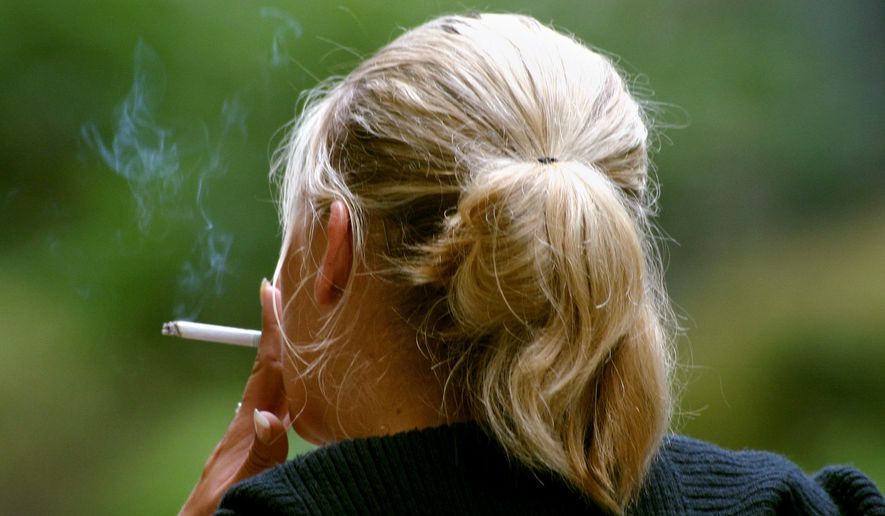MOSCOW — The U.N.’s World Health Organization on Tuesday approved a measure committing countries around the world to sharply raise excise taxes on cigarettes and other tobacco products, a key step to what critics warn will be a push for a global tax on tobacco.
Meeting in Moscow this week, WHO delegates, representing 179 countries and about 90 percent of the world’s population, voted to move ahead on implementing a key part of the 2003 Framework Convention on Tobacco Control. The WHO is the public health arm of the United Nations.
The international tobacco tax provision would commit the countries who signed the U.N. antitobacco agreement — nearly every major nation except for the United States, Switzerland and Indonesia — to enact an excise tax equal to at least 70 percent of the retail price of tobacco products.
The gathering got off to a controversial start when delegates voted to bar members of the media, including a credentialed reporter for The Washington Times, from attending key convention and plenary events.
U.S. and Canadian representatives are also boycotting the event to protest host Russia’s recent incursions in the conflict with neighboring Ukraine.
WHO officials said the tax was justified because tobacco creates an economic burden on society owing to higher health care costs for tobacco-related disease. More than two-thirds of the parties to the organization’s treaty reported an increase in tobacco taxes in 2014.
SEE ALSO: JOHNSON: The UN’s health agency works on a global tobacco tax in secret
According to the WHO’s report, “Parties that have increased tobacco taxes in general experience a corresponding increase in tobacco prices and, in some of those countries, a tax-driven reduction in tobacco consumption has been documented.”
WHO Director-General Margaret Chan told delegates at the opening of the five-day gathering that it was vital to take on an industry and an addiction that the agency says is responsible for an estimated 6 million deaths worldwide each years.
“I am proud to be the No. 1 enemy of the tobacco industry,” Ms. Chan said. “That is a badge of honor for me.”
But critics warn a uniform global tax won’t work and will only encourage smuggling and illegal trade in tobacco products without cutting down on smoking rates.
“One size does not fit all,” said American economist Arthur Laffer. “Tobacco regulation and taxation are complex matters that require consideration of a number of political, economic and demographic factors prior to deciding on tax structures and levels.”
New York-based cigarette giant Philip Morris International echoed Mr. Laffer’s criticisms.
The world’s governments “don’t need international organizations to tell them which tax structure and tax level best match their domestic economic and social conditions,” Philip Morris spokeswoman Iro Antoniadou told the Agence France-Presse news service this week.
Taxes and smuggling
Mr. Laffer, an expert on tax policy and a member of President Reagan’s Economic Policy Advisory Board in the 1980s, quit smoking more than 40 years ago. He even lost his mother to lung cancer. Mr. Laffer told The Washington Times that if he had one single wish, it would be to eliminate all tobacco addiction. He said he agrees “100 percent” with the WHO goal of cutting global tobacco use.
But, “if you raise tax rates and cause people to smuggle cigarettes … it’s not wonderful,” said Mr. Laffer, who released his own tobacco analysis titled “Handbook of Tobacco Taxation: Theory and Practice,” in which he criticizes the blanket approach on tobacco taxation.
Mr. Laffer said that a global tobacco tax may simply push smokers to the more dangerous and unregulated black market. “The difference between tobacco and heroin is that the government follows and is in touch with tobacco smokers,” he said.
The Framework Convention Alliance, an organization that advocates for global tobacco control, highlighted a 2010 WHO study that concludes that increasing tobacco taxes by 50 percent in some 22 low-income countries would generate roughly $1.4 billion in funds, money which could increase health spending by 50 percent in these countries.
The WHO’s Framework Convention on Tobacco Control favors introducing smoke-free public places, banning tobacco advertising and requiring pictorial health warnings on cigarette packages in addition to increasing taxes.
But Mr. Laffer points to Australia, where the graphic pictures of the dangers of tobacco use have not lived up to their backers’ hopes.
“Australia has this thing where they put disgusting pictures on the back of cigarettes,” Mr. Laffer said, but smokers just buy fake packs, or different containers, to carry around their cigarettes after they are purchased. He believes that tobacco users — especially smokers — “want nicotine from tobacco and will go to incredible lengths to get it.”
Andrei Muchnik, a spokesman for the World Health Organization, declined comment on the Tuesday vote, but WHO officials reject the idea that the vote to implement the Convention’s Article 6 amounts to a U.N.-mandated global tobacco tax.
Article 6 states that, “without prejudice to sovereign right of the parties to determine and establish taxation policies,” signatory countries should adopt measures including implementing tax and price policies that reduce tobacco use and “prohibiting or restricting, as appropriate, sales to and/or importations by international travellers of tax- and duty-free tobacco products.”
“The guidelines do not impose a minimum tax rate on cigarettes, but will be a tool that will allow each state to pursue a policy to determine the appropriate tax level,” Martin Logan, a spokesman for the Framework Convention Alliance, an NGO that supports the treaty, told the Agence France-Presse.
⦁ Alex Swoyer reported from Washington. This article was based in part on wire service reports.
• Drew Johnson can be reached at djohnson@washingtontimes.com.
• Alex Swoyer can be reached at aswoyer@washingtontimes.com.




Please read our comment policy before commenting.